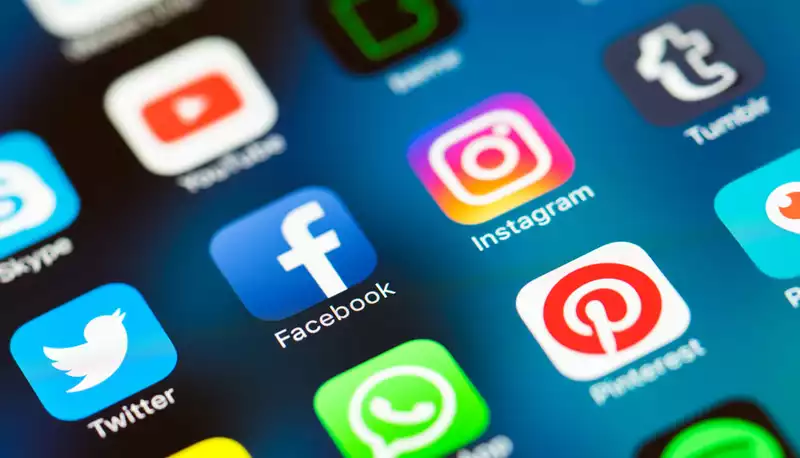Have you ever wondered how much of your personal information your favorite iPhone apps use or provide, and it may come as no surprise that Instagram and Facebook are the "worst of the worst."
Among the other "most invasive" apps (we'll come back to that designation later) are LinkedIn, GrubHub, Uber, Uber Eats, a Swedish shopping app called Klarna, a British train ticketing app called Trainline
Invasions.
Among those with the "least" invasiveness were Microsoft Teams, Netflix, Signal, Telegram, Zoom, and the hot app Clubhouse. None of them collected data for their own or third-party use for marketing or advertising purposes.
Swiss cloud storage service pCloud made these lists by checking the App Store's App Privacy Disclosures, which Apple began requiring in December 2020.
pCloud revealed its findings in a blog post earlier this month. It was not clear from the blog post how many apps pCloud reviewed, but it clearly focused on well-known apps.
Specifically, pCloud counted the number of times an app used personal data for internal advertising and marketing or for third-party advertising.
Apple categorized the types of data disclosed by apps into 14 categories: browsing history, contact information, contacts, diagnostics, financial information, health and fitness, identifiers, location information, purchase history, search history, sensitive information, usage data, user content, and other data.
According to pCloud, Instagram apps share 11 of these 14 categories, or 79%, with third parties for the purpose of selling advertising; 12 of the 14, or 86%, are used for their own advertising and marketing; and 12 of the 14, or 86%, are used by third parties for the purpose of selling advertising.
Facebook, Instagram's stablemate as a company, matches this 86% score for its own apps with respect to its own advertising and marketing, and ranks second in the third-party sharing ranking with a score of 57% (8 out of 14 categories).
The specific categories listed by pCloud did not quite match what can be seen in the US version of the App Store - perhaps European privacy rules produce different results on the other side of the Atlantic.
LinkedIn and Uber Eats shared third place among the apps that shared the most personal data with third parties, each scoring 50%. Right behind them were Trainline, YouTube, and YouTube Music, each with 43% (6 of 14).
Among the apps that used the most personal data for their own marketing, third place went to Klarna and Grubhub, each with 64% (9 out of 14), and behind them were Uber and Uber Eats, each with 57%.
Even pCloud's own iPhone app is not to blame. The service was not analyzed, but we looked at the App Store. pCloud apps use four categories of personal data: purchases, contact information, identifiers, and usage data.
The result is an invasiveness score of 29% for internal marketing and advertising, which puts it in the middle of Lyft, ESPN, Grindr, and others. (The pCloud app does not share data with third parties.)
The pCloud blog post also included a third ranking called "the amount of data each app tracks overall."
Instagram and Facebook topped the list as well, followed by Uber Eats, Trainline, and eBay.However, pCloud did not explain how they got the numbers in that graph, and we were unable to find out how. (Instagram scored 67%, lower than the average of the other two scores.) We asked pCloud about this, as well as how they decided which apps to analyze.
Now, back to the designation "invasive." It is difficult to put a clear definition on the issue of privacy. For what may seem invasive to one person may be perfectly fine to another.
For example, I don't care if a third party sees what I buy on Instagram, but I do care that Instagram shares my financial information, contacts, contacts, search and browsing history. You may feel differently.
It should also be kept in mind that these rankings are based entirely on what app developers choose to share with Apple. Apps that do not fully disclose such information may be kicked out of the App Store, but that does not mean that all apps are honest.
We already know that thousands of iPhone apps leak personal information from back-end cloud servers. It is a safe bet that many iPhone apps have privacy-leaking errors in their code and are unaware of them.
Unfortunately, unlike Android, Apple is unable to disassemble the app code to check for errors or suspicious behavior, so we will never know how many there are.
The silver lining is that you can control much of what the app collects and shares about you. When you first open the app, it asks for some permissions, which you can grant, deny, or allow only while the app is in use. (You can also use the iPhone's "Settings" app to fine-tune what the app collects about you, but that process is not as clear-cut as when you first open the app.
.









Comments